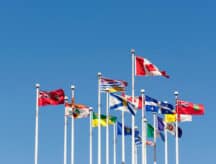Settlement funds can make or break your application for permanent residence
Candidates in all three Express Entry economic immigration classes should take special note of recently announced revisions to the amount of settlement funds required by Immigration, Refugees and Citizenship Canada (IRCC).
A 1.42 per cent increase was implemented January 5, 2018, that raised the minimum amounts required as follows:
| Number of family members | 2017 amount (in Canadian dollars) |
2018 amount | Increase |
|---|---|---|---|
| 1 | $12,300 | $12,474 | $174 |
| 2 | $15,312 | $15,530 | $218 |
| 3 | $18,825 | $19,092 | $267 |
| 4 | $22,856 | $23,181 | $325 |
| 5 | $25,923 | $26,291 | $368 |
| 6 | $29,236 | $29,652 | $416 |
| 7 | $32,550 | $33,013 | $463 |
| Each additional family member | $3,314 | $3,361 | $47 |
IRCC deems these amounts necessary in order for successful applicants for permanent residence to support themselves and their family while they settle in Canada. Family members include a spouse or partner, dependent children and the dependent children of a spouse or partner. IRCC considers a dependent child to be any family member under the age of 22.
When determining the size of your family, applicants must include those who will be accompanying them to Canada as well as those who may be remaining behind.
Small change, big impact
While relatively small, the revised amounts can mean the difference between an eligible and an ineligble profile in the Express Entry pool, or your application for permanent residence being approved or refused.
Furthermore, while only Federal Skilled Worker and Federal Skilled Trades candidates are asked to confirm that they have access to the required funds when determining their eligibility for the Express Entry pool, candidates in the Canadian Experience Class who receive an Invitation to Apply (ITA) through the Federal Skilled Worker Class must also prove they have the necessary funds.
It is therefore important that all candidates in the Express Entry pool ensure their Express Entry profile is updated and that they have the required amount of funds at all times in order to act on an ITA quickly should they receive one. Why? Because in order apply for permanent residence, a candidate must provide recognized proof that such funds are readily available to them.
Such funds can be in the following forms:
- Cash.
- Documents that show property or capital payable to the applicant, such as stocks, bonds, debentures and treasury bills.
- Documents that guarantee payment of a set amount of money, which are payable to the applicant, such as banker's drafts, cheques, travellers’ cheques and money orders.
For proof, IRCC says an applicant must get official letters from any banks or financial institutions where they are keeping money. These letters must attest to details including any outstanding debts such as credit cards and loans and the current balance of their account(s) and the average balance for the past six months.
IRCC stipulates that the funds cannot be borrowed from another person and the applicant will be asked to explain any large, lump sum transfers into an account.
If a candidate is accompanied by a spouse or partner, funds held in a joint account or funds held in an account in their spouse’s name only can be applied to the required amount. In the latter case, proof must be provided that the applicant has access to these funds.
The only exemptions to the proof of funds requirement are granted to Express Entry candidates who are already working in Canada and have a valid job offer.
"Ensuring that your Express Entry profile or application for permanent residence reflects that you have the required settlement funds for the size of your family is vital," says Attorney David Cohen, senior partner at the Canadian immigration law firm Cohen, Campbell. "It's little details like this that can result in big headaches if you're not careful. Being diligent with regards to settlement funds is the best way to avoid this kind of trouble."
Find out if you are eligible for Canadian Immigration by filling out our FREE online assessment form
© 2018 CICNews All Rights Reserved
- Do you need Canadian immigration assistance? Contact the Contact Cohen Immigration Law firm by completing our form
- Send us your feedback or your non-legal assistance questions by emailing us at media@canadavisa.com







